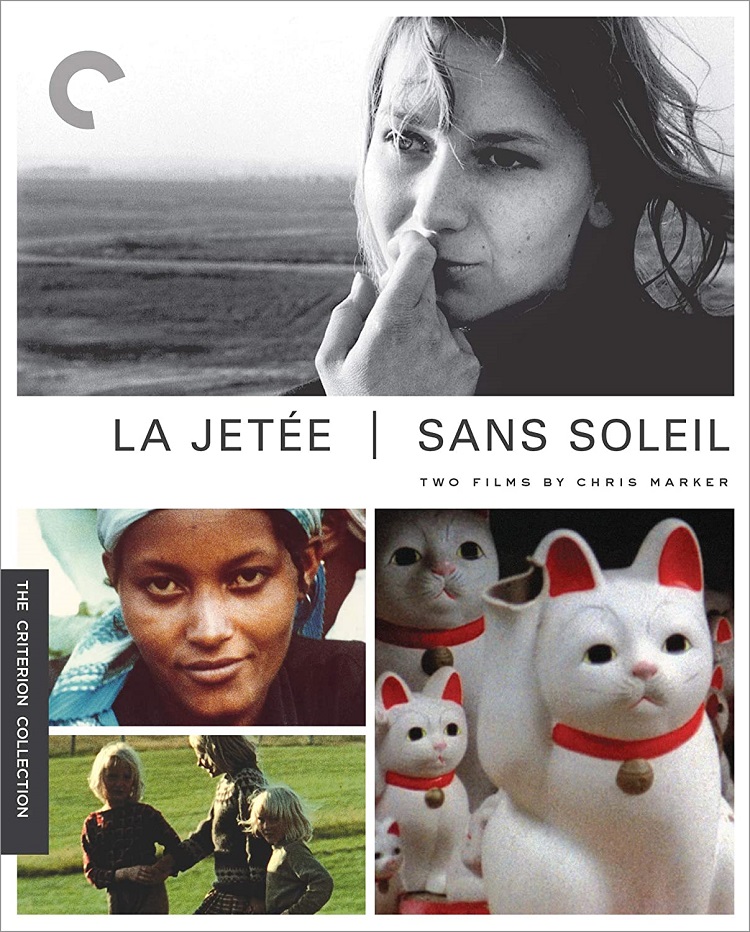
Director Chris Marker’s two most well-known works have been compiled into one Criterion release, but only one of them is worth revisiting. Surprisingly, it’s the black and white La Jetee, comprised almost entirely of stills, rather than the color and full-motion Sans Soleil.
La Jetee tells a science fiction time travel story by utilizing narration over a series of still photographs. It sounds like a terrible idea, but the end result is completely transfixing even if it’s not always fully comprehensible. There’s no attempt to add simulated motion to the photos by panning or zooming, it’s literally just still after still except for one momentary motion scene. Marker’s radical experiment in film structure feels a bit like watching a slide show, but those slides are artfully shot sequential frames of a story. That story involves a shadowy experiment undertaken by a post apocalyptic group of scientists as they marshal their meager resources to locate a suitable candidate for time travel in the hopes of finding some way out of their dreary present. Once identified, the participant is strapped into a chair and outfitted with a wired mask as he travels back and forth through time in search of salvation for his people. The film was a source of inspiration for Terry Gilliam’s 12 Monkeys, and also served as the basis for a David Bowie music video in the ‘80s. It’s still influential today, and well worth watching.
Marker continues his reliance on narration in Sans Soleil, but here it’s free-form stream of consciousness rambling that ends up coming off as pretentious artsy nonsense instead of compelling storytelling. The images are moving and in full color this time, but they’re comprised of travel footage shot primarily during trips to Japan and Africa. Frankly, viewers intent on watching the film are advised to just turn off the narration and attempt to glean whatever anthropological entertainment they can from this footage shot mostly in the early ‘80s. The camera just captures Japanese and Africans going about their daily lives, not focusing on any particular subjects but certainly juxtaposing the wide chasm between the two cultures. Japanese men intently playing early arcade video games such as Carnival are followed by Africans tribesmen eking out a modest existence in their villages, while the narration drones on about nothing to do with either of them. Footage from other areas including Iceland and the US appear briefly, but the focus always returns to the other two primary cultures. There’s no apparent point to be made, just Marker sharing his vacation footage and loopy narration with viewers. Note: ASPCA and PETA members should be warned to stay far away, as the film’s African adventure includes explicit footage of an unsuspecting giraffe being shot through the neck and head for sport, a horrific scene that appears without warning and really should have been consigned to a Faces of Death compilation instead of this film.
The image quality of both films on Blu-ray is very good, although for some reason there’s a great deal of jitter in the still film La Jetee. Surely it couldn’t have been that hard to correct this during restoration, considering the source material is, you know, still. The uncompressed monaural sound quality is inconsequential since the narration of both films is center stage with precious little surrounding it. Bonus features include two interviews with filmmaker Jean-Pierre Gorin, a brief video piece about Marker by filmmaker and critic Chris Drake, a look at the aforementioned Bowie music video, an analysis of Hitchcock’s Vertigo and its influence on Marker, and Junkopia, a completely inconsequential short by Marker and associates about temporary art installations erected on Northern California mudflats.